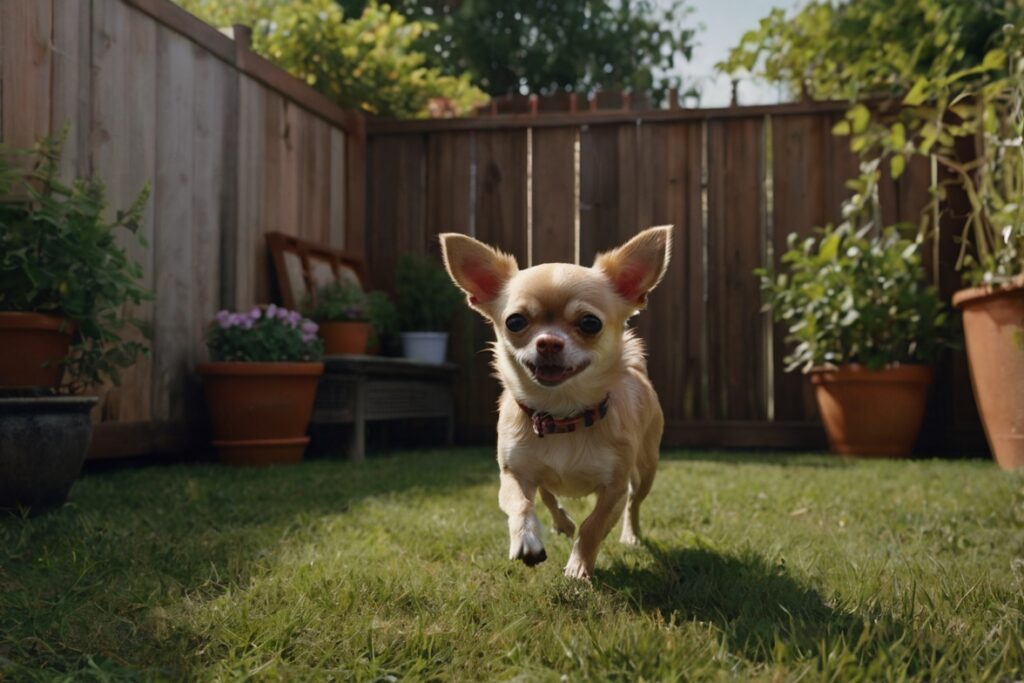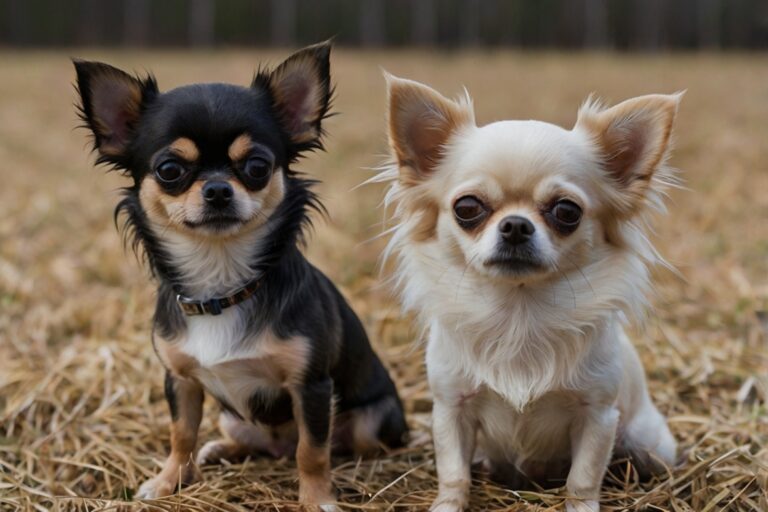Chihuahua Pregnancy: Essential Care Guide For Beginners

Caring for a pregnant Chihuahua requires special attention to her health, environment, and overall well-being. From the early signs of pregnancy to ensuring a smooth delivery, it’s important to understand the unique needs of this small breed. In this guide, we’ll walk you through every step of Chihuahua pregnancy care, ensuring your furry friend has a healthy pregnancy and delivers happy, healthy puppies.
1. Understanding Chihuahua Pregnancy
Chihuahua pregnancy, like other dog breeds, follows a clear cycle that consists of several stages. The pregnancy, also called gestation, lasts around 58 to 68 days, with the average being approximately 63 days. Understanding the different stages of pregnancy is crucial because it allows you to better care for your pet during this vulnerable period.
1.1 Overview of the Chihuahua Pregnancy Cycle
In the first stage, which covers the first two to three weeks of pregnancy, most physical changes may not be very visible. Internally, however, significant changes are happening. Fertilization takes place in the first few days, and the embryos begin to develop. Many Chihuahua owners may not notice any immediate difference in their dog’s behavior or physical appearance at this point. However, subtle signs such as tiredness or a slight reduction in activity may emerge.
By the fourth week, the embryos have settled into the uterus, and you may notice slight weight gain or changes in your Chihuahua’s behavior. Toward the end of the pregnancy cycle, the belly becomes noticeably enlarged, and nesting behaviors such as searching for a comfortable spot to rest may become more frequent. Each of these stages requires different levels of care, making it essential to track your dog’s progress throughout the entire cycle.
1.2 Signs of Pregnancy in Chihuahuas
Recognizing the signs of pregnancy in Chihuahuas early is crucial for providing appropriate care and preparing for the upcoming delivery. The first signs may be subtle and easily overlooked. One of the earliest indications is a change in behavior. Many Chihuahuas become more affectionate or clingy, seeking more attention from their owners. Others may start displaying nesting behaviors, such as gathering blankets or towels to create a comfortable resting place.
Physical signs may also begin to manifest in the early stages. A slight increase in appetite is often one of the first clues that your Chihuahua might be pregnant. However, it’s important not to confuse this with general weight gain. Pregnant Chihuahuas may also experience morning sickness similar to what humans go through. This typically happens around the third or fourth week and may cause your dog to vomit or lose her appetite temporarily.
As the pregnancy progresses, more visible signs become apparent. The abdomen will start to swell, particularly after the fourth week, and the nipples will become more prominent and darker in color. This physical change is a natural response as the body prepares to nourish the puppies. By keeping an eye on these signs, you can identify pregnancy early on and take the necessary steps to ensure your Chihuahua remains healthy throughout her gestation.
1.3 How Long is a Chihuahua’s Pregnancy?
The average pregnancy duration for a Chihuahua is around 63 days, though it can vary slightly between individual dogs. Chihuahuas have a shorter gestation period than larger dog breeds, so it’s essential to be well-prepared early in the pregnancy. The first few weeks might not show many outward signs, but this is when the embryos are forming and attaching to the uterine wall. By the second month, your Chihuahua will be well into her pregnancy, and the signs will be more pronounced.
Understanding the length of a Chihuahua’s pregnancy can help you know what to expect at each stage. During the first 30 days, it’s important to monitor her appetite, behavior, and any other subtle changes. By the time your dog is in the second half of the pregnancy, regular veterinary checkups become essential. During these visits, the vet can check the puppies’ development and ensure everything is progressing smoothly.
As the 63-day mark approaches, it’s crucial to prepare for labor. Chihuahuas can sometimes give birth a few days early or late, so keeping track of the timeline is vital. Having a whelping box ready for the birth is a good way to ensure your Chihuahua has a safe and comfortable space to deliver her puppies. Proper planning allows you to respond quickly when labor begins and minimizes any potential complications.
1.4 Importance of Early Detection and Vet Consultation
Early detection of pregnancy in Chihuahuas is important not only for the mother’s health but also for the wellbeing of the unborn puppies. It’s always a good idea to visit a veterinarian if you suspect your Chihuahua might be pregnant. Early pregnancy detection can be achieved through several methods, including a physical exam, hormone tests, or an ultrasound. Ultrasounds are particularly useful because they can detect fetal heartbeats as early as three weeks into the pregnancy, giving you a clear indication of how many puppies to expect.
Once the pregnancy is confirmed, regular vet checkups are necessary. These checkups will monitor the health of both the mother and her developing puppies. The vet will also provide guidance on necessary dietary changes, any supplements that might be needed, and advice on how to prepare for labor and delivery. These early consultations are a great opportunity to ask any questions you might have about caring for your Chihuahua during pregnancy.
Beyond confirming the pregnancy, early detection allows you to identify and address any potential complications early on. Some Chihuahuas are prone to certain pregnancy-related conditions, such as hypoglycemia or eclampsia. Catching these issues early through regular veterinary care can ensure they are managed effectively, reducing the risk of serious problems for both the mother and her puppies.
2. Preparing for Your Chihuahua’s Pregnancy

2.1 Setting Up a Safe and Comfortable Environment
One of the first steps in preparing for your Chihuahua’s pregnancy is creating a safe and comfortable environment for her to rest and eventually give birth. Chihuahuas are small dogs, and during pregnancy, they can become more sensitive to their surroundings. Start by setting up a quiet, low-traffic area in your home where she can relax and avoid stress. This space should be warm, free from drafts, and ideally in a part of the house where she can have some privacy but still be close to her human family for comfort.
You’ll also want to create a comfortable nesting area for your Chihuahua to rest. A whelping box is an ideal choice. The box should be big enough for your dog to move around in but not too large, as smaller spaces tend to provide a sense of security. Lining the box with soft, washable blankets or towels will provide the necessary cushioning for both the mother and her puppies once they arrive. Make sure the bedding is clean and change it regularly to maintain hygiene.
2.2 Dietary Changes and Supplements for Pregnant Chihuahuas
A Chihuahua’s nutritional needs change significantly during pregnancy, and it’s important to provide her with a diet that supports both her health and the healthy development of her puppies. In the early stages of pregnancy, you might not notice a significant change in appetite, but as her pregnancy progresses, she will need more calories and specific nutrients to support her growing litter. It’s advisable to switch to a high-quality puppy food during the second half of the pregnancy, as these formulas are higher in essential nutrients such as protein, calcium, and DHA.
Supplements can also play an important role during pregnancy, but they should be used cautiously and under the guidance of a veterinarian. Calcium supplements may be needed to prevent conditions like eclampsia, which can be caused by a sudden drop in calcium levels after giving birth. Omega-3 fatty acids are another beneficial addition, supporting brain development in the puppies and improving the mother’s skin and coat health. However, avoid over-supplementing, as this can lead to complications, so always consult with your vet before introducing new supplements.
2.3 Regular Vet Checkups During Pregnancy
Regular vet checkups are critical throughout your Chihuahua’s pregnancy to ensure that both the mother and her puppies are healthy. During these visits, the vet will monitor the pregnancy’s progression, check for any potential complications, and guide you on how to handle each stage of the pregnancy. A vet may also perform an ultrasound or x-ray to confirm the number of puppies and assess their development, particularly in the later stages of pregnancy.
These checkups are also an opportunity to discuss dietary changes, vaccination schedules, and any medications your Chihuahua may need. Regular monitoring helps ensure the pregnancy progresses smoothly, and it also allows for early detection of any conditions such as gestational diabetes, eclampsia, or infections that could endanger both the mother and her litter. Vet visits will provide peace of mind and help you be better prepared for labor when the time comes.
2.4 Socializing and Managing Stress in Pregnant Chihuahuas
Stress management is essential during pregnancy, as too much stress can negatively affect both the mother and her puppies. Chihuahuas are naturally more nervous and anxious than some other breeds, so providing a calm, stable environment is crucial. Keep her daily routine as consistent as possible and avoid introducing significant changes during the pregnancy. Limit exposure to loud noises, unfamiliar visitors, or other pets that may cause stress or discomfort.
While it’s important to reduce stress, maintaining a normal level of socialization with familiar people is equally necessary. Pregnant Chihuahuas still need attention and care from their owners. Gently engaging with her through petting and talking can be comforting. Avoid any rough play or activities that could cause harm to the puppies. Additionally, short, gentle walks can help her stay active and reduce anxiety, promoting better physical health and emotional wellbeing during pregnancy.
3. Nutrition and Diet for Pregnant Chihuahuas

3.1 Recommended Foods for Pregnant Chihuahuas
Proper nutrition is crucial during your Chihuahua’s pregnancy to ensure that she stays healthy and that her puppies develop properly. A high-quality commercial dog food designed for pregnant or nursing dogs is a good starting point. These foods are typically rich in protein, fat, and essential vitamins and minerals that will support the increased energy and nutrient demands of pregnancy. Many veterinarians recommend switching to a puppy food formula during the second half of pregnancy, as it provides higher levels of nutrients that support both the mother and growing puppies.
In addition to commercial dog food, you can incorporate nutrient-dense, safe human foods like cooked eggs, plain yogurt, or lean meats like chicken and turkey. These foods are excellent sources of additional protein, calcium, and fats that support both the mother and her puppies. However, avoid feeding raw meats or unpasteurized dairy products, as these can carry harmful bacteria. Make sure to introduce new foods slowly to avoid upsetting her stomach.
3.2 How to Manage Portion Sizes and Frequency
During the first few weeks of pregnancy, your Chihuahua’s food intake may not need to increase significantly. However, as her pregnancy progresses, you’ll need to gradually increase the portion sizes to meet her growing energy needs. By the final weeks of pregnancy, she may be eating 1.5 to 2 times her normal amount. The increased caloric intake is essential to fuel both her body and the growing puppies.
Due to her small size and limited stomach capacity, it’s best to feed your Chihuahua smaller, more frequent meals. Divide her daily food into three or four portions instead of two large meals. This approach ensures that she can consume enough calories without feeling overly full or uncomfortable. Monitoring her weight is also important—while some weight gain is normal, obesity can cause complications during pregnancy and delivery, so make sure you’re feeding her appropriately without overfeeding.
3.3 Foods to Avoid During Pregnancy
There are several foods that you should avoid feeding your Chihuahua during pregnancy, as they can be harmful to both her and her puppies. Chocolate, caffeine, and alcohol are well-known toxins to dogs and should never be given. Grapes, raisins, and avocados can also be toxic and should be avoided at all costs. Foods containing high levels of salt, sugar, or fat can lead to digestive issues or exacerbate health conditions during pregnancy.
Raw or undercooked meats, eggs, and fish pose a risk of salmonella or other bacterial infections that can harm both the mother and puppies. It’s also wise to avoid feeding processed human foods, especially those containing artificial additives, preservatives, or excessive amounts of fat and sugar. Stick to whole, natural ingredients and high-quality dog food specifically designed for pregnant dogs to ensure a safe, balanced diet.
3.4 Water Intake and Hydration Needs
Staying hydrated is particularly important during pregnancy, as dehydration can cause complications for both the mother and her puppies. Ensure that your Chihuahua has access to clean, fresh water at all times. Pregnant dogs often drink more than usual due to their increased energy demands and metabolic rate. You may notice her drinking more frequently as the pregnancy progresses, which is normal.
Make sure the water bowl is always full and easily accessible. Some Chihuahuas can be finicky drinkers, especially if they don’t like the temperature of the water or the bowl itself. If your dog seems reluctant to drink, try offering water at room temperature or switching to a different bowl. In some cases, adding a small amount of low-sodium chicken broth to her water can encourage her to drink more. Always monitor her water intake, especially during the later stages of pregnancy, as dehydration can lead to serious health issues for both her and the puppies.
4. Exercise and Activity Guidelines for Pregnant Chihuahuas

4.1 Suitable Exercise Routines for Pregnant Chihuahuas
Maintaining a healthy level of exercise during pregnancy is important for your Chihuahua’s overall health and helps prepare her for the physical demands of labor. However, the exercise routine should be modified to suit her energy levels and comfort as the pregnancy progresses. During the early stages of pregnancy, Chihuahuas can continue their regular activities, such as short walks or light play sessions. These activities help keep her muscles toned and reduce excess weight gain.
As the pregnancy advances, you should gradually reduce the intensity of exercise. Focus on shorter, more frequent walks rather than long, strenuous ones. Aim for gentle, low-impact activities that don’t put stress on her body, such as slow-paced walks or light indoor play. The key is to keep her moving while avoiding overexertion. Regular exercise helps improve circulation, digestion, and mental stimulation, all of which contribute to a healthier pregnancy.
4.2 When to Limit Physical Activity
While exercise is important, there are times when you may need to limit your Chihuahua’s physical activity. In the later stages of pregnancy, particularly during the final two to three weeks, her energy levels may decrease, and she will naturally slow down. This is a signal that you should reduce the duration and intensity of walks and allow her to rest more often. If she seems tired or uncomfortable, let her take it easy and avoid pushing her beyond her comfort level.
It’s also important to monitor your Chihuahua for any signs of distress or discomfort during exercise. If she becomes overly panting, starts limping, or shows any signs of pain, stop the activity immediately and let her rest. Avoid any rough play, jumping, or running, especially in the last few weeks of pregnancy, as these activities could lead to injuries or complications with the pregnancy. Always observe her behavior closely and adjust her activity level accordingly.
4.3 Importance of Maintaining a Healthy Weight
Maintaining a healthy weight during pregnancy is crucial for the wellbeing of both the mother and her puppies. Overweight Chihuahuas may face complications during delivery, such as difficulty with labor or a higher risk of requiring a C-section. On the other hand, underweight dogs may not have the necessary energy reserves to support the pregnancy and delivery, which can affect the health of the puppies.
Regular, moderate exercise helps prevent excessive weight gain, while a balanced, nutrient-rich diet ensures that your Chihuahua receives the necessary calories without overfeeding. Monitoring her weight throughout the pregnancy, in consultation with your veterinarian, will allow you to make any needed adjustments to her diet or exercise routine. Maintaining the right balance between activity and rest will ensure that she stays in optimal shape for the duration of her pregnancy.
4.4 Recognizing Fatigue and Rest Needs
Pregnant Chihuahuas, especially in the later stages of pregnancy, will need more rest than usual. Fatigue is normal as the body works harder to support the growing puppies, and it’s important to allow her to rest when she needs it. Make sure her environment is quiet and comfortable, providing plenty of soft bedding where she can relax undisturbed. While gentle exercise is still important, always prioritize her comfort and let her rest when she shows signs of tiredness.
Chihuahuas may sleep more often or retreat to their nesting area as the pregnancy progresses. This behavior is natural and helps conserve energy for labor and delivery. If your Chihuahua seems excessively fatigued or lethargic beyond what’s expected, it’s important to consult your veterinarian, as this could be a sign of underlying health issues. In general, keeping a balance between exercise and rest will support a healthy and stress-free pregnancy for your Chihuahua.
5. Common Pregnancy Issues in Chihuahuas

5.1 Potential Health Risks and How to Spot Them
Chihuahuas, being small dogs, are more susceptible to certain pregnancy complications compared to larger breeds. One of the most common issues is dystocia, or difficulty during labor, due to the small size of the mother relative to the size of the puppies. Early signs of dystocia may include prolonged labor, visible discomfort without the delivery of puppies, or straining without results. It’s critical to monitor your Chihuahua closely during pregnancy and especially during labor. If you notice any signs of distress or prolonged labor, contact your veterinarian immediately, as a C-section might be necessary.
Hypoglycemia, or low blood sugar, is another concern for pregnant Chihuahuas. This condition can be life-threatening if not treated promptly. Early signs include lethargy, shaking, and lack of coordination. If your Chihuahua shows any of these symptoms, it’s important to offer a quick source of glucose, such as honey, and seek immediate veterinary care. Regular vet checkups and proper nutrition help reduce the risk of this condition, but awareness and early detection are key to preventing serious health issues.
5.2 Managing Morning Sickness and Digestive Issues
Just like humans, Chihuahuas may experience morning sickness during the early stages of pregnancy. This is usually caused by hormonal changes and typically occurs around the third or fourth week. Symptoms include occasional vomiting or a temporary decrease in appetite. While this is usually mild and self-limiting, it’s important to ensure that your Chihuahua stays hydrated and continues to eat, even if in smaller amounts.
If the morning sickness becomes severe or persists beyond the early weeks of pregnancy, it’s time to consult your vet. Digestive issues may also arise later in pregnancy as the growing puppies put pressure on the mother’s stomach, leading to indigestion or bloating. Feeding smaller, more frequent meals can help alleviate these discomforts. Ensure that she has access to fresh water and avoid feeding her rich or greasy foods that may aggravate digestive problems.
5.3 Monitoring Weight Gain and Loss
It’s essential to monitor your Chihuahua’s weight throughout her pregnancy, as both excessive weight gain and weight loss can pose risks to her health and the health of the puppies. Rapid weight gain can lead to obesity, which can complicate labor and delivery. On the other hand, insufficient weight gain or weight loss could indicate that the mother is not receiving adequate nutrition or that there is an underlying health issue affecting her pregnancy.
Ideally, your Chihuahua should gain a moderate amount of weight throughout the pregnancy, with most of the weight gain occurring in the second half of gestation. Regular weigh-ins at the vet and at home will help you keep track of her progress. If you notice significant weight fluctuations, consult your veterinarian, who may recommend dietary adjustments or additional supplements to ensure a healthy pregnancy.
5.4 Identifying and Handling Pregnancy Complications
Some Chihuahua pregnancies may encounter complications that require medical intervention. One common complication is eclampsia, a life-threatening condition caused by low calcium levels in the mother. Symptoms include muscle tremors, restlessness, fever, and seizures. If your Chihuahua shows any of these signs, immediate veterinary attention is required, as eclampsia can progress rapidly. Calcium supplements and careful monitoring of calcium intake during pregnancy can help prevent this condition.
Another potential complication is uterine inertia, where the muscles of the uterus fail to contract properly during labor, leading to a stalled delivery. This condition can be life-threatening if not addressed promptly, as it can lead to fetal distress or death. Early signs of uterine inertia include prolonged labor without progress or complete cessation of contractions. If you suspect your Chihuahua is experiencing this condition, contact your vet immediately, as emergency intervention, including a possible C-section, may be needed.
By being vigilant and attentive to your Chihuahua’s health throughout her pregnancy, you can reduce the risk of these complications and ensure a smooth and healthy delivery.
6. Labor and Delivery Care for Chihuahuas

6.1 Preparing for the Whelping Process
As your Chihuahua’s pregnancy nears its end, it’s important to prepare for the whelping process (the birth of the puppies). Start by creating a comfortable and safe environment where your Chihuahua can give birth. A whelping box is ideal, as it provides a secure space for the mother to deliver her puppies. The box should be large enough for her to move around but small enough to give her a sense of security. Make sure the box is lined with soft, clean bedding that can be changed easily.
Keep the whelping area in a quiet, low-traffic part of your home, away from any disturbances. Chihuahuas are naturally anxious dogs, so a calm and stable environment is crucial to reduce stress during labor. You should also prepare a whelping kit with items such as clean towels, gloves, scissors (for cutting the umbilical cord), and iodine (to disinfect the cord stump). Having these supplies ready will ensure that you can assist if needed and provide immediate care to the newborn puppies.
6.2 Signs Your Chihuahua is Ready to Give Birth
Knowing when your Chihuahua is about to go into labor is key to ensuring you’re prepared for the whelping process. In the days leading up to labor, you may notice a few behavioral and physical signs indicating that birth is imminent. One of the most noticeable signs is nesting behavior—your Chihuahua may become restless and start to search for a secluded area to give birth. She may scratch at her bedding or try to create a more comfortable space for herself.
Physical signs include a drop in body temperature, which occurs 24 to 48 hours before labor begins. You can monitor this by taking her rectal temperature daily as her due date approaches. A normal Chihuahua’s temperature ranges from 100°F to 102°F, but when it drops to around 98°F, labor is likely within 24 hours. Additionally, her abdomen may become noticeably firm, and she may lose interest in food.
During the first stage of labor, your Chihuahua may pant, tremble, or whine as her body begins to prepare for delivery. She will also have contractions, although these may not be immediately visible. Once labor starts, make sure she’s comfortable in her whelping box, and avoid disturbing her as much as possible.
6.3 Assisting During Labor: What to Expect
Most Chihuahuas can deliver their puppies without human intervention, but it’s important to be on hand in case complications arise. Once the first stage of labor is complete, the second stage, active labor, begins. This is when the puppies are born. Each puppy is delivered in its own amniotic sac, which the mother will instinctively break open and clean. However, if she doesn’t do this right away, you’ll need to gently tear the sac and help clear the puppy’s airway by wiping its nose and mouth with a clean towel.
Puppies are usually born between 15 minutes to an hour apart, but in some cases, the mother may take longer between deliveries. If more than two hours pass without the birth of the next puppy, or if your Chihuahua appears to be in distress, contact your vet immediately. Once all the puppies are born, the mother will likely eat the placentas—this is a natural behavior that helps her regain some of the nutrients lost during birth.
Throughout the process, keep an eye on your Chihuahua for signs of fatigue or distress. If she seems overly tired, disoriented, or unable to push, veterinary intervention may be necessary. In some cases, Chihuahuas may require a C-section due to the small size of the breed and potential complications with delivering large puppies.
6.4 Post-Labor Care for the Mother and Puppies
Once the labor process is complete, it’s time to focus on post-labor care for both the mother and her newborn puppies. The mother will likely be tired and need plenty of rest, so it’s important to keep the whelping area quiet and comfortable. Provide her with fresh water and food, as she will need to regain strength and energy after the delivery. Offer high-quality puppy food or a special diet recommended by your vet to support her recovery.
Check the puppies to ensure they are nursing properly and staying warm. Chihuahuas are small dogs, so the puppies can get cold quickly. Make sure the whelping box is in a warm environment, and consider using a heat lamp or heating pad if necessary, ensuring the puppies can move away from the heat source if they get too warm. Monitor the puppies closely in the first few days to ensure they are gaining weight and not showing signs of distress.
Your vet should examine both the mother and the puppies within 24 to 48 hours after birth to ensure everyone is healthy. The vet can check for any signs of infection in the mother and confirm that the puppies are nursing properly and developing as they should. Post-labor care is crucial in the first few weeks of life, so maintaining a clean and safe environment for both the mother and her litter will help ensure a healthy recovery.
Final Thoughts
Proper care and preparation are essential for a successful Chihuahua pregnancy. By understanding her needs, monitoring her progress, and ensuring a safe environment, you can support your Chihuahua through every stage of pregnancy and delivery. With the right care, both mom and puppies will thrive, and you’ll enjoy the rewarding experience of welcoming new life into the world.
Podcast
Ready to learn all about Chihuahua pregnancy? Listen to our latest podcast episode below or download the transcript for valuable insights on caring for your pregnant Chihuahua!






